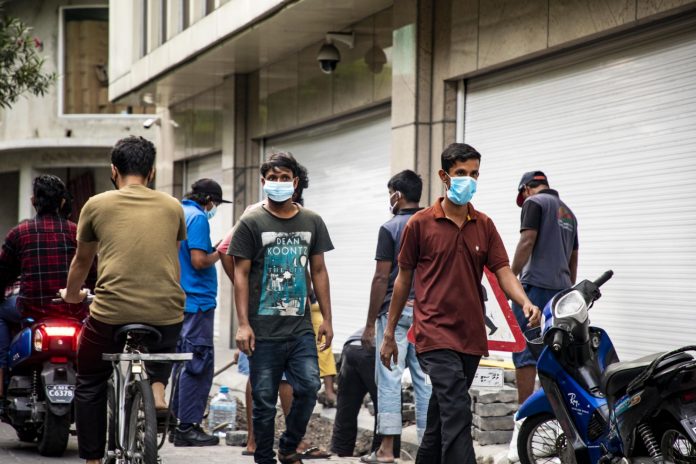It is often said that government policy initiatives can have serious implications for businesses. It can cause costs associated with the business to either increase or decrease – directly in the form of taxes, fees and charges, or indirectly in the performance of obligations dictated by the policy initiative.
The Expatriate Employees Regulations[1] is one recent example that creates direct and indirect cost implications.
A direct cost would be the requirement to pay an annual fee of MVR2,000.00 per quota. For some companies with a sizeable expatriate workforce like 600 employees, this can mean an immediate addition of MVR1.2million every year, just on quota fees alone.
An indirect cost would be the requirement of an employer’s compliance with enhanced obligations on the accommodation provided to expatriate employees[2].
This post is a focused review of accommodation obligations under the Regulations.
Painting with a broad brush
It is undisputed that expatriate employees have suffered in extremely poor shelters dwellings and circumstances almost at levels unfit for human habitation. It is accepted that the spread of Covid-19 pandemic has exposed their vulnerabilities even more sharply forcing the government to take immediate and costly remedial action.
These realities may be among the reasons which motivated the birth of this set of Regulations. But now that the Regulations are introduced, they are to stay and apply across the board to all employers and expatriate employees alike.
On a detailed review of the Regulations, one quickly recognizes the fact that it speaks of standards that ought to apply uniformly to accommodation occupied by all kinds and types of expats in the country. Also, it becomes noticeable pretty soon that the provisions may perhaps have been designed and developed on or around construction worksites and labor quarters – making it difficult for certain other types of employers to just pivot or adjust.
New Accommodation Framework
The central provision is section 26 of the Regulations which says that arrangement of expat accommodation falls on the employer. This is the current practice. However, it does not stop there, but adds a few more detail and goes on to point at Schedule 6.
According to the section, the employer can have its own staff accommodation. It can also use the services of a commercial service provider who is in the business of providing accommodation for expats. Additionally, professional employees may choose their own accommodation as well.
The section also says that expat accommodation shall meet requirements of Schedule 6. That is the Schedule which provides detailed guidance on the measurements, standards, facilities and condition of all accommodation used by all expatriates.
Section 26 also gives the minister the discretion to amend revise and adjust the accommodation standards provided in the Schedule based on changes made to economic policy or employment policy of the country.
Until such revision occurs to economic or employment policy, every employer (who employs expats) has a continuing obligation to arrange accommodation in a manner consistent with standards provided in that Schedule 6. Any failure may result in disciplinary action being taken against the defaulting employer in accordance with Schedule 7.
Therefore, the entirety of accommodation obligations may be understood with a collective reading of section 26 of the Regulations and two of its Schedules: Schedule 6 and Schedule 7 – one on guidance criteria and the other on disciplinary action.
The power to take action resides with the minister. The minister is every minister responsible for expatriate employees at the time. At present, it is the Minister of Economic Development.
Overview of Schedule 6
The Schedule speaks of three types of accommodation:
- The employer could appoint a service provider who is in the business of providing accommodation on a commercial basis for expat employees;
- The employer may provide its own accommodation under its own management and maintenance for its own expat employees; and
- Where the expat falls within a professional classification, he/she may elect to arrange his/her own accommodation.
Registration
The employer has an obligation to register with the Xpat System[3] the type of accommodation it has chosen for the expatriates. Additionally, it has to register the specific accommodation address at which the employees are housed. That becomes the “accommodation site”.
The employers who already have expatriate staff in the Maldives under current employment approvals are required to register their accommodation sites with the Xpat System within 2 months from the date of the Regulations.
Those who provide accommodation on a commercial basis as a business to expatriates are also required to register with the Xpat System, as a service provider. They are to register their accommodation sites as well. The application and registration are all processed online via the Xpat System.
Own Accommodation
If the employer were to provide its own accommodation to its expat employees, the employer may do so at premises owned or rented by it. Where the employer chooses this path, the employer has to register with the Xpat System that it provides its own accommodation and provide details of the address at which the accommodation is provided. The accommodation address becomes the accommodation site.
In making an application for registering an address as an accommodation site, an employer should provide evidence of ownership (if own property) or lease agreement (if rented premises) together with details of bed capacity, floor plan and facilities at the premises.
This rule applies just the same to accommodation provided by service providers as well. They have to register themselves as service providers and register their premises subsequently as accommodation sites.
When a request is made for registration (whether by an employer or a service provider to register a property as an accommodation site), an inspection would be carried out to verify if requirements of Schedule 6 guidance criteria are met in respect of those premises. The registration would be successful only if the inspection of the proposed accommodation site ends favorably.
Service Provider Accommodation
Where an employer wants to arrange accommodation through a commercial service provider, the request must be made via the Xpat System to the intended service provider directly. The service provider must approve it via the same portal. The commercial arrangement between the employer and the service provider must also be filed with the system.
Unless the service provider has approved the request from an employer, the employer will not be treated as having arranged accommodation with a commercial service provider.
Professionals
Where a professional expatriate elects to have his/her own accommodation, the expatriate is required to submit to his/her employer the relevant details of the accommodation: the floor plan of the premises, total rooms, total beds, facilities and amenities at the premises in addition to details of those joining him/her in accommodation at the premises.
Once the information is provided, the obligation is on the employer to register those premises as the accommodation site of that employee on the Xpat System. Additionally, the employer has to ensure that the accommodation chosen by the expat meets the guidance criteria provided in Schedule 6.
Owner’s Liability
Where any accommodation is on rented premises, there is a continuing obligation on the owner of the property to ensure that the rented property is being used for permitted purposes. Also, the owner of the property is required to keep and maintain details of all expatriates living at the premises, and advise the employer and the ministry of any breaches.
Accommodation Guidance
In addition to the regulatory framework summarized above under “Overview of Schedule 6”, the Schedule contains a second half dedicated to detailed guidance on condition, standards, measurements, facilities and amenities to be found in each of the accommodation sites used by expats.
The guidance speaks of requirements over room sizes, distance between beds, height between floor and ceiling, water, sanitation, health, hygiene, kitchen, food preparation area, waste collection, waste disposal, sun shading, protection from rain, lighting, ventilation and cross ventilation, pest control, maintenance, security and storage facility for valuables.
A property that fails to comply with those standards may not be approved for registration as an accommodation site. A registered accommodation that falls short of any of those respects may invite liability under Schedule 7.
Overview of Schedule 7
Schedule 7 is the penalty schedule. It basically outlines the kind of action that may be taken against a defaulting party.
Actions that can be taken include: cancellation of the employment approval of an employee and repatriation of the relevant employee; reduction or cancellation of the quota; imposition of a fine; being blacklisted on the Xpat System (denying service via the system); and investigation by an investigating agency.
Action may be taken against an employer, an employer’s representative; an employee and a service provider of accommodation.
Conclusion
It may be useful for all employers (employing expat employees) to have a quiet read of Schedule 6 and Schedule 7.
Compliance is a must and compliance must be achieved inside 2 months from the date the Regulations came into effect. Therefore, the cutoff date would be 12 October 2020.
About the Author; Nasheed & Co Law Firm is one of the leading corporate and commercial law firm in the Maldives, established in 1997. They are an efficient, convenient, and responsive firm of professionals providing a client-centric legal concierge service offering the full spectrum of corporate and commercial law advice assistance and support



















